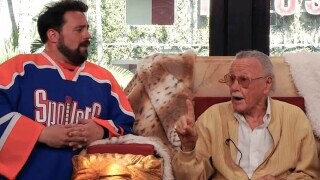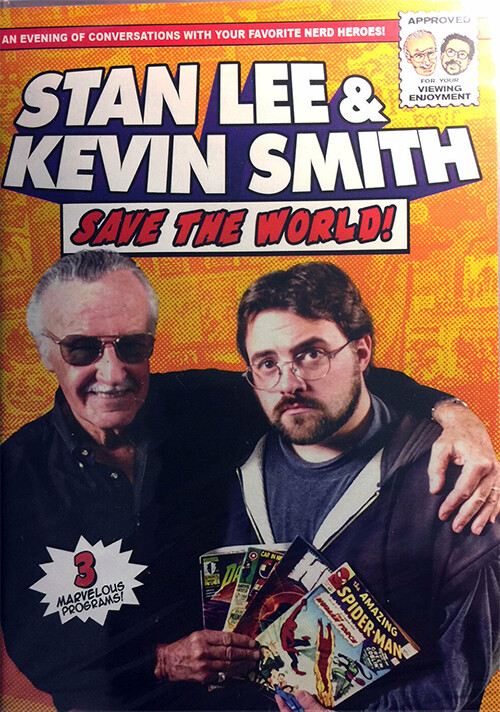Kevin Smith is the Stan Lee of Movie Comedy

Welcome to ComedyNerd, Cracked's daily comedy superstore. For more ComedyNerd content, and an assortment of Iran/Contra Affair convenience store items, please sign up for the ComedyNerd newsletter below.
Don't Miss
When you’re an icon of the 1990s indie film movement, your inspirations can come from unlikely places. For Richard Linklater, it was French minimalists. For Quentin Tarantino, it was blacksploitation films, spaghetti westerns, and toenail polish commercials. And for foul-mouthed comedy film heroKevin Smith? No one’s career path inspired him more than … Stan Lee?

eBay
“Stan is a god and a legend,” says Smith in the documentary With Great Power: The Stan Lee Story. Well, sure. The guy invented Spider-Man. But what does Lee have to do with Smith’s predilections for sex in convenience store bathrooms, falling in love with lesbians, or smoking copious amounts of cannabis?
It’s way more than Smith being a certified comic book geek. Sit back, True Believer, and let’s study the startling similarities that make Kevin Smith the Stan Lee of Movie Comedy.
Lee and Smith Specialized In Interconnected Fictional Worlds
Stan Lee didn’t invent the crossover in comic books. Batman and Superman had been buds for decades, and it wasn’t unusual for pre-Marvel Age superheroes to pop up in one another’s comics.
But what was unusual was the way in which Stan Lee’s early Marvel comic stories interconnected. What happened in a given month’s issue of Fantastic Four might launch a subplot in that same month’s Incredible Hulk. which might be referenced in a few frames of next week’s Dr. Strange. Before there was such a thing as the Marvel Cinematic Universe, Lee (and fellow inventors like Jack Kirby and Steve Ditko) created a cosmos where all of the parts connected.
Likely due in part to Smith’s comic book obsession, many of his comedies also take place in a weirdly connected universe (or as Smith fans would call it, the View Askewniverse). Mallrats takes place one day before the events of Clerks. Chasing Amy’s comic artists create characters based on Jay and Silent Bob. The two stoners are everywhere in Smith comedies, dropping snoochie booches in Dogma and the numerous sequels to all of the above.

Miramax
Sure, characters recur in Star Wars and Lord of the Rings movies but those are all continuations of the same general story. You’d be hard-pressed to find another filmmaker -- much less a comedy filmmaker -- who has created a universe with so many shared characters in seemingly disparate stories. (Except the Marvel movies, of course.)
They Both Are Multi-Hyphenates (and writing probably isn’t what they do best)
Ask a random mom what Stan Lee is famous for and she’ll probably say “writing comic books.” Truth be told, however, he wasn’t that into it. “I don’t enjoy writing that much,” Lee told his brother, Larry Lieber. “I write because I can do it and I do it easily and to earn a living.”
In his biography, Excelsior, Lee cheerfully dissed his comics work: “Being the ultimate hack, I would start doing my thinking when I sat down in front of the typewriter, and not a minute before. While I got a kick out of doing comics, it was just a job to me.”
Writing took a back seat to what Stan Lee was truly great at: Being Stan Lee. Even though his name was plastered on Marvel comic books for decades, he was pretty much done writing them by the early 1970s. Instead, Lee turned his attention to whatever caught his mustachioed fancy in the moment -- reality TV, screenplays, web series, porny cartoons and trying to convince Hollywood to make Marvel movies.
Taking a page from Stan’s playbook, Kevin Smith is less in the film business than he is in the Kevin Smith business.
While his films have garnered increasingly harsh reviews over the years (2016’s horror/comedy Yoga Hosers, for example, sits at 23% on Rotten Tomatoes), Smith has been building an empire doing anything and everything that tickles his toes -- a staggering number of podcasts, comic books, public appearances, and reality TV. He’s also directing geeky TV shows like Supergirl and The Flash, but not because he thinks he brings much to the table as a director. “I bring no vision, whatsoever,” he confessed to Vulture.
But those TV side-gigs are excellent fodder for the rest of it. “What those are good for is content, because if I’m going to stand on a stage and talk, you’ve got to be relevant and talk about new adventures.”
You can’t say the guy isn’t working it. “The only reason I ever have anything going on all the time is because I’m so f---ing terrified of becoming irrelevant that I have to be in as many places as possible,” Smith says. “If one stop doesn’t work, I can jump to another one and say, ‘Well, this was always the aim!’”
They’re Both Shameless Promoters
Or as Stan might have put it: “Whoa! Hold it! Stop everything! And behold the senses-shattering spectacle of the slickest salesmen in the solar system!”
“What I learned from (Stan) from an early age long before I met him was pride in the work,” Smith said at the 2019 San Diego ComicCon. “It’s not enough to do the work, you got to go out and be a big fan of the work too, if you expect other people to be a fan of the work.”

Marvel
Stan Lee had the world’s greatest hype man: Stan Lee. (When Jack Kirby left Marvel for DC in the early 1970s, he created the thinly veiled Lee doppelganger Funky Flashman, whose chief talent was self-promotion.) Lee saved his best writing every month for Stan’s Soapbox, a breathless stream of bombastic BS where he could promote that month’s comics and, more importantly, himself. All of the Stan-isms that we associate with the Man today -- True Believer, Face Front, Excelsior! -- came to life in Stan’s Soapbox.
In true Stan style, Smith learned that he was better at selling himself than any movie studio ever could. After a series of box office frustrations in the 2000s, Smith decided to take his Red State movie directly to the people. He went on a barnstorming tour of America, showing his film at a premium price and then taking the stage for a night of Smith-centric entertainment. With no middleman taking a healthy cut of the profits, Smith made his money back and then some. The key was realizing that Kevin Smith, not Kevin Smith movies, was the star of the show.
They Both Are Experts At Repackaging Their Audiences’ Nostalgic Past
What are Marvel movies if not favorite childhood characters coming to life? That’s part of the brilliance of the MCU -- they’re not just selling entertainment, they’re selling you back your childhood. one plastic action figure at a time.

Twentieth Century Fox
And that’s why everyone loved Stan’s cameos in the Marvel movies. It was a nod to a simpler time, a hat tip to the man who started it all.
To this day, Smith isn’t afraid to trade on Stan nostalgia, dotting his social media streams with old pics featuring his hero.

IMDB
Smith was savvy enough to trade on Marvel nostalgia before it was cool, convincing Stan to do a cameo in 1995’s Mallrats (a full seven years before Lee would pull a little girl from fallen debris in Tobey Maguire’s Spider-Man). It’s hard to remember in an MCU world, but Smith was reintroducing Lee to the masses at that point, an homage to his hero.
"This is me presenting this guy who the world doesn't know, to a new generation … like this is a guy that created Spider-Man, man. And so I felt like I was doing him a solid in '95," Smith explained.
The original scene called for Lee to lecture Jason Lee on holding on to love. The cagey Lee asked Smith to tack on one more scene where he could explain that he didn’t actually lose an old girlfriend -- his wife Joanie was really the love of his life. Was that just Lee’s play to placate Joan? In part, but “Stan was also one of the great marketers this world has ever seen,” said Smith in a takes-one-to-know-one revelation. “In asking me to add that scene, he literally doubled his part in the movie, which I think was chiefly his aim.”

Marvel
Stan repaid that solid years later when he showed up in Captain Marvel reading the Mallrats script at a time when Smith wasn’t exactly at the forefront of pop culture.
“That to me is my Oscar,” Smith says. “They'll never give me an Academy Award. That's totally fine. But that moment was like my Oscar."
Then there’s Smith trading on his own nostalgia as well, constantly revisiting the characters he created in movies like the many iterations of Jay and Silent Bob movies and TV specials, as well as the upcoming Clerks III.
Next year, you’ll see Clerk, a documentary about, well, Clerks and the rise of Kevin Smith. Want more? How about the recently released Kevin Smith’s Secret Stash: The Definitive Visual History, a personal scrapbook stuffed with moviemaking memorabilia. After all of the public lectures, podcasts, and DVD commentaries, it’s hard to imagine that Smith still has untold stories but why the hell not? “I honestly think that I’m more in the nostalgia business than anything else,” Smith says. “Everything I do is predicated on the past.”
“Even if you go back 10 years ago when we were doing the Comic Book Men show on AMC, it wasn’t about new stuff, it was about all these comic books we used to love to read,” Smith told The Daily Beast. The nostalgia train continues with Smith’s animated takes on Masters of the Universe: Revelation and Sam and Twitch.
You Showed Me
In Lee’s final days as hangers-on allegedly tried to take advantage of a dying rich man, Kevin Smith was the one sounding the alarm. Heck, he even invited Lee to come live with him.
And when Lee passed at age 95 in 2018, Smith posted a heartfelt eulogy on his Instagram page that highlighted the bonds between them:

Hulu
You were the first creator whose voice I knew before I’d ever actually heard it.
You showed me how to interact with the audience whenever you stepped onto Stan’s Soapbox to reach out to the readers. You showed me how to advocate for my field beyond the actual art itself whenever you tub thumped for comic books outside of the medium.
It was never enough for you to simply make a comic because you were a true salesman at heart. So you not only sold comics, you sold me *on* comics - so much so that I built a life and career around your dreams and ideals. When you did Mallrats with us, you not only made a lifelong fan’s dream come true, you also lent me comic book credibility that I still get to spend today.
Outside of my parents, you were the one adult who gave me the most useful life skills I still use today. Thank you, Stan, for making me not only the boy I was but also the man I am today. You had great power and you always used it responsibly, fostering billions of dreamers who all know your name - a name written in the stars for all time. You were not just the literary titan of comic books, you were our modern day Mark Twain. I will miss you all my days, my friend and hero. Excelsior forevermore.
For more ComedyNerd, be sure to check out:
Comedy Impressions That Changed Politics
5 Second City Performers That Deserve Better
'The Onion': 5 Behind-The-Scenes Stories From America's Finest News Source
Top Image: Hulu
